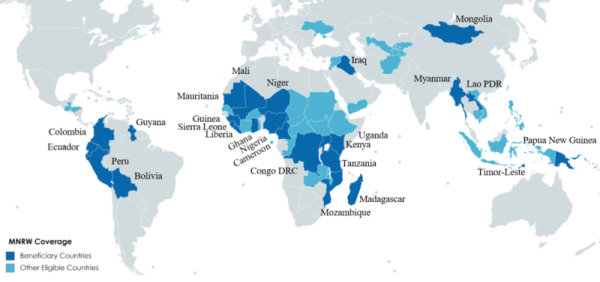Managing Natural Resource Wealth Thematic Fund
The Managing Natural Resource Wealth Thematic Fund (MNRW-TF) was launched by the IMF in 2011 with several development partners to help countries build capacity to manage their natural resource wealth effectively. The fund also helps create a stable macroeconomic environment for exploration and exploitation of natural resources, helping to ensure that they are managed in a socially responsible way.
Overview
The MNRW-TF was designed to respond to the fact that many resource-rich developing countries fail to realize the full development potential of their natural resources. This is especially the case for countries that have significant extractive industries—oil, gas, and mineral resources. In principle, these resources can enlarge the fiscal space available to finance the public goods and services needed to support sustainable development and poverty reduction. However, in practice, governments often fail to properly address the institutional and policy challenges that come with natural resources, and development outcomes for these countries have been disappointing—a characteristic sometimes referred to as the “resource curse.”The goals of the MNRW-TF are to assist resource-rich countries in the following areas:
- Help countries ensure that the size of resource-related taxes appropriately balance their need to finance their development goals while still protecting incentives for investors.
- Support efforts to improve the administration of, and compliance with, resource taxes.
- Build capacity to design and implement macroeconomic and macroprudential policies in countries that are highly dependent on large and inherently volatile resource revenues.
- Improve statistics that inform policy decisions on, or affected by, exploitation of natural resources.
- Enhance transparency, thus promoting good governance and an attractive investment climate, and encourage governments to reach out to civil society, and complement the implementation of the Extractive Industries Transparency Initiative (EITI).
This program was initially funded in an amount of US$25 million by: Australia, European Union, Kuwait, Netherlands, Norway, Oman and Switzerland. Phase 2 of the program was launched in late 2016 and is fully operational as of May 1, 2017. It is envisages as US30 million fund and has already received contributions from Australia, the Netherlands, Norway and Switzerland.
The MNRW-TF has provided an effective basis for the IMF to work with partners to help low- and lower-middle income countries achieve material improvements in the management of their resource wealth. Several of such cases have been profiled in the September 2016 pamphlet Assisting Resource-Rich Countries Mobilize and Manage Their Revenues.
Modular Approach
Phase 2 of the MNRW-TF concentrates on capacity development in five areas for improving extractive industry (EI) fiscal regimes and revenue management in recipient countries. These modules are as follows:
- Module 1: EI fiscal regimes, licensing, and contracting
- Module 2: EI revenue administration
- Module 3: Macro-fiscal, public financial management, and expenditure policy
- Module 4: Exchange rate regimes and macroprudential policies
- Module 5: Statistics for managing natural resources
Delivery Modes
The MNRW-TF delivers TA through multiple channels in order to maximize impact:
- IMF headquarters staff: Design and deliver technical assistance, in the context of diagnostic and review missions, working with country authorities to provide advice that is tailored to their needs and implementation capacity.
- Short-term experts: Under the oversight of IMF staff, provide specialized skills in specific areas to support the implementation of IMF technical advice.
- Conference, workshops, and seminars: deliver targeted training and disseminate lessons learned.
Analytical Work
The MNRW-TF supports the IMF’s leading research and analytical work on managing natural resource wealth, to identify good or best practice approaches and distill lessons from experiences. Significant work has been done including:
-
The release of two handbooks on: Administering Fiscal Regimes for Extractive Industries: A Handbook (recently translated into French and Spanish); and Sovereign Asset-Liability Management Guidance for Resource-rich Countries.
-
Public release of a stylized version of the IMF’s Fiscal Analysis for Resource Industries (FARI) model, together with an accompanying Technical Notes and Manual. The FARI model is a modeling framework developed to perform EI fiscal analysis, and can be used for assisting in the design of EI fiscal regimes, revenue forecasting, and revenue administration.
-
Development of a template for collecting data on government revenues from natural resources which has been field-tested in several countries. In a significant confirmation of the importance of the template, the EITI announced it will collaborate with the IMF in using the template to improve transparency.
Peer Learning
The MNRW-TF has financed four successful regional conferences on EI fiscal issues were held in East Africa, Asia-Pacific region, and the Andean region (2 conferences), with between 60 and 90 participants at each conference. These conferences provided a forum for participating countries to exchange views and experiences on the fiscal challenges and macroeconomic considerations they face in relation to natural resources, while also learning from the experience of international experts. In addition, a conference was held in Washington DC to discuss international issues for the EI sector, with the papers being used as a basis for a book on International Tax Issues for the Extractives Industries.
Governance
A Steering Committee comprising representatives of the external donor partners and IMF staff guides the MNRW-TF work. This Committee provides strategic guidance and contributes to setting policies and priorities, endorses annual work plans, and monitors program performance and achievements. Technical assistance needs and work plans are identified and prioritized in discussions between recipient countries and the IMF.Beneficiaries

The list of countries and regional organizations that have benefited from TA under the MNRW-TF is as follows: Bolivia, Cameroon, Colombia, Democratic Republic of the Congo, ECOWAS, Ecuador, Ethiopia, Ghana, Guinea, Guyana, Indonesia, Iraq, Kenya, Lao PDR, Liberia, Madagascar, Mali, Mauritania, Mongolia,Mozambique, Myanmar, Niger, Nigeria, Papua New Guinea, Peru, Sierra Leone, Solomon Islands, Tanzania, Timor-Leste, Uganda, Zambia.


